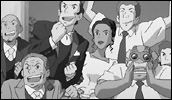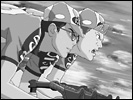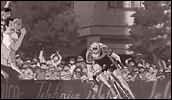Nasu: Summer in Andalusia
- Year
- 2003
- Original title
- Nasu Andarushia no Matsu
- Japanese title
- 茄子 アンダルシアの夏
- Director
- Cast
- Running time
- 47 minutes
- Published
- 6 October 2003



by Tom Mes
The first-ever Japanese animation film selected for the Cannes film festival, Nasu: Summer in Andalusia is the directorial debut of former jack-of-all-trades Kitaro Kosaka. With the film's rather brief running time virtually excluding any chance of it receiving the kind of attention heaped upon other feature-length anime of the recent past, the most obvious hook here is the fact that its director is a long-time cohort of Studio Ghibli and above all that he was the animation director on Hayao Miyazaki's much-lauded Spirited Away.
Though he's worked on such studio highlights as Grave of the Fireflies, Pompoko and Princess Mononoke, Kosaka's credits include more than just contributions to the Ghibli cannon, taking in a milestone like Katsuhiro Otomo's Akira and Rintaro's Metropolis among many others. Nasu, however, is more interesting for the way in which it deviates from the Ghibli template than for how much it resembles it.
Faithfully adapted from Iou Kuroda's short manga of the same name, Nasu follows the exploits of Spanish cyclist Pepe as he competes in the Vuelta d'España, the Iberian equivalent of the Tour de France. This particular leg, a gruelling trawl through arid Andalusia at the height of summer, happens to cross through the streets of Pepe's home town, on the very same day as the wedding of his older brother Angel to his own former girlfriend Carmen. This having been one of the reasons Pepe left the town to pursue a career as a professional cyclist, it's all the more frustrating for him to realise that his career hasn't developed the way he wanted it. The cycling equivalent of a proxy, his function in the team is to strategically aid their top racer to emerge victorious. This time however, with the sponsor harbouring intentions to lay him off and his family and friends cheering him on, Pepe decides to break the mould.
Kosaka chose to make Nasu at Madhouse studios rather than at his 'home base' Studio Ghibli. Known for producing films as diverse as Metropolis, Ninja Scroll and Satoshi Kon's Millennium Actress, Madhouse is a studio less stylistically defined than Ghibli, for whom Nasu probably would have been too big a departure from the house style.
This is not to say that Nasu is a major departure for Japanese animation. It doesn't tread particularly new ground in terms of its character design for instance (although the clean drawing style is an improvement upon the original manga's rather unpolished artwork), but the director's personal touches are frequent enough to raise it a notch above stylistic convention. The boldest of these is doubtlessly the sudden shift in drawing style towards the end of the film. Directly lifted from the manga, it works marvellously well in animated form, expressing a great sense of dynamics, while at the same time pulling the viewer in close to the action.
Also worthy of note is Kosaka's matter-of-fact rendition of Andalusia, captured in numerous overhead shots that mimic the POV of a helicopter-bound TV crew, which are quite a departure from the idealised images of a dreamlike Europe that are such a staple of Miyazaki's films. Paradoxically, the film pays attention to accuracy, but at the same time doesn't linger on details. Where Miyazaki's lovingly rendered minutiae show his passion for the 'otherness' of Europe, in Kosaka's film buildings and entire towns zoom by in split seconds as the competitors focus only on the goal ahead.
Nasu is not entirely devoid of exoticism, though. The wedding scene of Angel and Carmen inevitably culminates in the bride performing a spot of flamenco for added local colour, but at the same time Kosaka manages to inject more universal meaning into both a local symbol like the pickled eggplant from which the film derives its name ('nasu' being Japanese name for eggplant) and the story as a whole, expanding where necessary upon the original's slim story to add nuance.
It remains to be seen whether Nasu can overcome the hurdle of its uncommercial running time in finding proper foreign distribution. It certainly deserves to be brought to a wider audience than those lucky few who caught it in Cannes. Even though the film is unlikely to revolutionise the industry, its director Kitaro Kosaka is clearly one of the more promising young talents working in mainstream Japanese animation today.